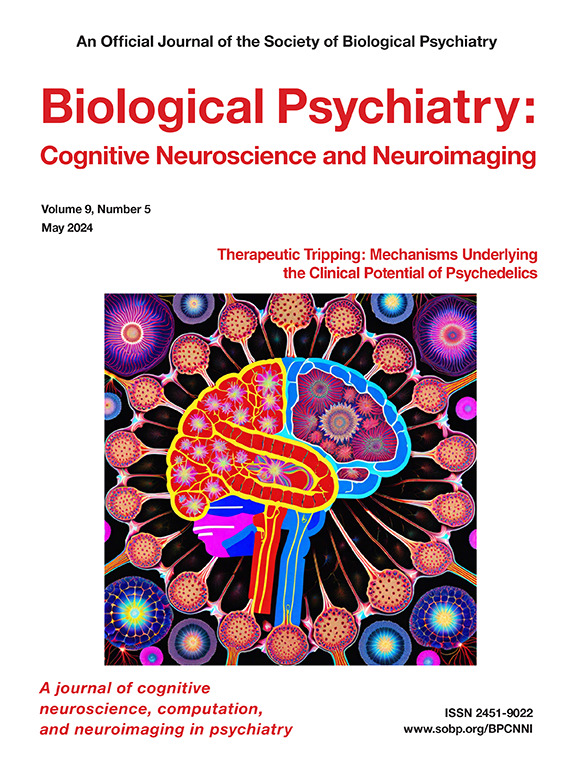Antipsychotic-Induced Dysregulation of Glucose Metabolism Through the Central Nervous System: A Scoping Review of Animal Models
IF 5.7
2区 医学
Q1 NEUROSCIENCES
Biological Psychiatry-Cognitive Neuroscience and Neuroimaging
Pub Date : 2025-03-01
DOI:10.1016/j.bpsc.2024.10.001
引用次数: 0
Abstract
The use of antipsychotic drugs is associated with adverse metabolic effects. Disruptions in glucose metabolism such as hyperglycemia and insulin resistance have been shown to occur with antipsychotic use, independent of changes in body weight or adiposity. The regulation of whole-body glucose metabolism is partly mediated by the central nervous system. In particular, the hypothalamus and brainstem are responsive to peripheral energy signals and subsequently mediate feedback mechanisms to maintain peripheral glucose homeostasis. In this scoping review of preclinical in vivo studies, we aimed to explore central mechanisms through which antipsychotics dysregulate glucose metabolism. A systematic search for animal studies identified 29 studies that met our eligibility criteria for qualitative synthesis. The studies suggest that antipsychotic-induced changes in autonomic nervous system activity, certain neurotransmitter systems, expression of neuropeptides, and central insulin action mediate impairments in glucose metabolism. These findings provide insight into potential targets for the mitigation of the adverse effects of antipsychotics on glucose metabolism.
抗精神病药物通过中枢神经系统诱发的葡萄糖代谢失调:动物模型范围综述。
使用抗精神病药物会对新陈代谢产生不良影响。事实证明,使用抗精神病药物会导致糖代谢紊乱,如高血糖和胰岛素抵抗,与体重或脂肪的变化无关。全身葡萄糖代谢的调节部分由中枢神经系统(CNS)介导。特别是,下丘脑和脑干对外周能量信号做出反应,随后介导反馈机制以维持外周葡萄糖平衡。在这项临床前体内研究的范围综述中,我们旨在探索抗精神病药物导致葡萄糖代谢失调的中枢机制。通过对动物研究的系统检索,我们发现有 29 项研究符合定性综述的资格标准。这些研究表明,抗精神病药物诱导的自律神经系统活动、某些神经递质系统、神经肽表达和中枢胰岛素作用的变化介导了葡萄糖代谢障碍。这些发现为减轻抗精神病药物对糖代谢的不良影响提供了潜在的靶点。
本文章由计算机程序翻译,如有差异,请以英文原文为准。
求助全文
约1分钟内获得全文
求助全文
来源期刊

Biological Psychiatry-Cognitive Neuroscience and Neuroimaging
Neuroscience-Biological Psychiatry
CiteScore
10.40
自引率
1.70%
发文量
247
审稿时长
30 days
期刊介绍:
Biological Psychiatry: Cognitive Neuroscience and Neuroimaging is an official journal of the Society for Biological Psychiatry, whose purpose is to promote excellence in scientific research and education in fields that investigate the nature, causes, mechanisms, and treatments of disorders of thought, emotion, or behavior. In accord with this mission, this peer-reviewed, rapid-publication, international journal focuses on studies using the tools and constructs of cognitive neuroscience, including the full range of non-invasive neuroimaging and human extra- and intracranial physiological recording methodologies. It publishes both basic and clinical studies, including those that incorporate genetic data, pharmacological challenges, and computational modeling approaches. The journal publishes novel results of original research which represent an important new lead or significant impact on the field. Reviews and commentaries that focus on topics of current research and interest are also encouraged.
 求助内容:
求助内容: 应助结果提醒方式:
应助结果提醒方式:


